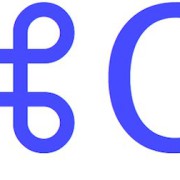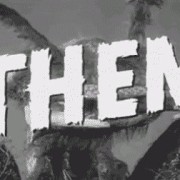Multiple multiplies
 The popularity of a word may rise and fall over the years. A word whose use has been multiplying for some time is the adjective multiple, as shown by this Google Ngram of frequency in publications:
The popularity of a word may rise and fall over the years. A word whose use has been multiplying for some time is the adjective multiple, as shown by this Google Ngram of frequency in publications:
Until quite recently, the meaning of multiple tended to be restricted to the numerous aspects of a single thing. Common examples would be multiple copies (copies of a single thing) and multiple injuries (sustained in a single incident). This is why multiple can modify a singular noun, eg multiple choice, multiple personality, multiple authorship, multiple birth, multiple embryo transfer, multiple occupancy, multiple pile-up, multiple orgasm.
But in recent years multiple has been used more and more to mean simply ‘numerous’. In fact numerous has declined as multiple has multiplied:
The shift in usage is shown more specifically by comparing the phrases multiple injuries and multiple people. Obviously the word people is more common than the word injuries, but the modification of people with multiple is a recent phenomenon:
(The recent slight decline in multiple injuries may be due to the rise of the alternative term polytrauma.)
The use of multiple to mean simply ‘numerous’ is more common, I think, in the USA (and Australia):
But the British are certainly following along:
Should users of quitted be acquitted?
 A Facebook friend and non-native English user recently announced, ‘I quitted my job.’ We can find quitted both in dictionaries and used by some native speakers online. But I recommend the past tense form quit, identical to the present tense form, like hit, split and slit. In other words I agree with the Cambridge online dictionary:
A Facebook friend and non-native English user recently announced, ‘I quitted my job.’ We can find quitted both in dictionaries and used by some native speakers online. But I recommend the past tense form quit, identical to the present tense form, like hit, split and slit. In other words I agree with the Cambridge online dictionary:
verb [I or T] (present participle quitting, past tense and past participle quit)
rather than with Oxford Dictionaries:
verb (quits, quitting; past and past participle quitted or quit)
This isn’t a matter of mere personal preference, but of actual usage. Google’s wonderful Ngram Viewer shows how quitted has gradually given way to quit in English-language publications:
That Ngram reflects both British and American literature. If we limit the search to Britain, we see that British behaviour, as in many other ways, has followed the American path with a lag of some decades:
What of the spoken language? Another great tool is Youglish.com, which finds examples of words in YouTube videos. A search for the phrase ‘he quit’ currently finds 37 examples:
How to pronounce ‘”he quit”‘ in English: 37 examples.
37 examples of how to pronounce ‘”he quit”‘ in English
including one from President Obama:
and this one from a British speaker:
A search for ‘he quitted’, on the other hand, finds only 4 examples:
How to pronounce ‘”he quitted”‘ in English
4 examples of how to pronounce ‘”he quitted”‘ in English
All of them are readings from books by dead authors. Moreover, these old uses of quitted exemplify the now fairly obsolete meaning ‘to exit from a place’ (eg to quit a room), like French quitter. In contemporary English quit generally means ‘to cease an activity’ (eg to quit a job, to quit smoking).
Note however that the verb acquit, meaning ‘to find not guilty’, has a regular past, acquitted.
While the wonderful people at Oxford Dictionaries aren’t guilty of a crime, I think their recommendation of quitted is a little misleading.
Bellaritalia
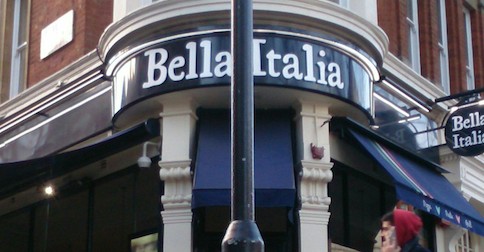 Dozens of police were called to London’s Leicester Square on Wednesday when a woman was taken hostage in a branch of the Bella Italia restaurant chain. The incident ended without violence, but not without letting us hear many journalists giving the restaurant its usual pronunciation in England, Bellaritalia. For example you can hear London Live’s correspondent saying it at 0:25 and 0:56:
Dozens of police were called to London’s Leicester Square on Wednesday when a woman was taken hostage in a branch of the Bella Italia restaurant chain. The incident ended without violence, but not without letting us hear many journalists giving the restaurant its usual pronunciation in England, Bellaritalia. For example you can hear London Live’s correspondent saying it at 0:25 and 0:56:
For most speakers in England (and Wales, Australia and New Zealand), Bella is a perfect rhyme with words like cellar and dweller. Similarly, tuna is pronounced exactly like tuner, panda exactly like pander, rota like rotor, cheetah like cheater, schema like schemer, etc. These words all end in a colourless ‘schwa’ vowel, ə. Those written with final -r are far more common than those written with final -a, many of which are foreign words and names.
Native speakers of all languages are only taught to read and write after they’ve acquired the spoken language. Native speakers in England know how to pronounce words like rota and rotor – ie identically – but they may be unsure of the respective spellings. So it’s not hard to find mis-spellings, like this chapter which begins ‘The helicopter rota blades thrash the air…’
Now when one of these words is followed by a vowel, r may appear as a link to it, eg cellar‿insulation, dweller‿in the dark. The r is particularly likely to be used when the words are a common combination, like for‿example or better‿off. This linking r was long ago generalized from the more plentiful and frequent -r words to the -a words. Which is why we also often get BellarItalia. And PizzarExpress:
And the Obamaradministration:
And BAFTArAwards, ChristinarAguilera, PatriciarAshby, RitarOra. And, at 0:20, SkodarOktavia:
The unwritten linking r is used not only by voice artists and newsreaders but also by those who are too posh to read TV news. Here’s Prince Charles saying cheetahrand snow leopards:
So, if you really want to sound English, you should at least consider doing the same.
My long blog post on linking r is here.
Them
 Many of the most common little words of English are usually pronounced with a weak, colourless vowel ‘schwa’, /ə/. This happens in British, American and many other Englishes. Listen to the, a, of, at, that, and, than, from an American TV news report:
Many of the most common little words of English are usually pronounced with a weak, colourless vowel ‘schwa’, /ə/. This happens in British, American and many other Englishes. Listen to the, a, of, at, that, and, than, from an American TV news report:
Here, extracted from those clips, are the weak words:
Another word commonly pronounced in this way is the pronoun them. Here are some examples, this time from British TV:
However, I often hear Americans pronounce them strongly, with its full vowel, in contexts where I would certainly say it with weak schwa. For example, them occurs twice in the American news report above, and both times it is /ðɛm/, not /ðəm/:
Why would them be pronounced more strongly, at least by some speakers, than the other little words illustrated above? The answer, I think, is to do with rhythm and grammar. Weak words typically ‘lean’ on following strong words, to which they are tied grammatically. This is true of the articles, prepositions and conjunctions above, eg the‿new standard, that‿all hoverboards, of‿at‿least.
But the object pronoun them is tied to the verb or preposition that precedes it. Often them is the last word in the utterance. Note that most of the usually-weak words become strong when nothing follows for them to ‘lean’ on, eg ‘She looked /ət/‿Fred’, but ‘Who did she look /at/?’
So perhaps, as time goes by, the weak form of them will be used by fewer speakers, across various accents of English.
Further notes
The written form that corresponds to more than one word. The conjunction, as in ‘books that Joe likes’, usually contains /ə/, while the demonstrative forms, as in ‘Joe likes that book’, always contain /a/.
Some scholars view coordinating conjunctions like and as connected equally to the preceding and following elements. The evidence of weak forms seems to support the alternative view that coordination resembles subordination, and that coordinating conjunctions are connected more closely to what follows than what precedes.
Great testes of America
 Italian phonetician (and expert on medical English) Alex Rotatori has drawn my attention to a TV campaign by McDonalds in Italy. It apparently promotes ‘great testes (= testicles) of America’:
Italian phonetician (and expert on medical English) Alex Rotatori has drawn my attention to a TV campaign by McDonalds in Italy. It apparently promotes ‘great testes (= testicles) of America’:
This is an American epidemiologist saying testes and kidneys:
And you can hear the similarity when the two testes are placed side by side:
But if you watch the actual ads, such as this one
you’ll see that the McDonalds campaign is actually for Great Tastes of America.
In native pronunciation, the final e of words like taste has been silent for centuries, functioning only to transform the preceding vowel. (Think of the difference between tap and tape, mad and made, past and paste.) To pluralize taste, we add only an s, like cat > cats, and no extra vowel. Transcriptions are here.
We can hear native tastes in McDonalds’ parallel campaign in Britain. The voiceover says ‘Great Tastes of America is back at McDonalds’:
(Note that ‘Great Tastes of America’ is treated as a singular, and r is used between America and is, standard practice in England. The music is Jerome Moross’ theme to The Big Country.)
You can compare the two testes with tastes here:
Tastes is a complex structure containing a tense vowel or diphthong followed by three consonants, s, t, s. The t is often lost, creating a long sː, but in the British ad above, the speaker (probably Dexter Fletcher) does produce two short s sounds separated by a very brief t. So, for non-natives, pronouncing tastes is tricky and may require practice; but transforming it into testes will strike native listeners as just plain nuts.
(Related post: Feel the p*n*s)
beRnie sande_s
This week American presidential aspirant Bernie Sanders, a self-declared socialist, almost defeated his better-known rival Hillary Clinton in the Iowa caucus.
By presidential standards, Senator Sanders’ Brooklyn (New York) accent is about as unusual as his politics. In American movies or TV dramas of the past decades, you’re more likely to have heard it from gangsters or New York cab drivers than from political leaders. (Woody Allen, six years older than Sen. Sanders, was also raised in Brooklyn, but his accent is not quite as strong.)
One of the big differences between Bernie Sanders’ accent and the majority accent General American (spoken by Hillary Clinton) is the pronunciation of r. General American pronounces an r sound always and only where r is written. But Sen. Sanders, like most people in England (and Wales, Australia and New Zealand), pronounces only some written r’s, and pronounces some r sounds which aren’t written. The basic rule is that such speakers pronounce r only when a vowel sound follows. So we hear all the r’s in revolution, try to protect the interests and very proud:
But Sen. Sanders doesn’t pronounce the r’s in not fair, our government, more wealth, all over and dollars:
This means that a word-final r is not pronounced if the next word begins with a consonant, as in for‿starvation wages, but is pronounced if the next word begins with a vowel, as in for‿our kids:
As in England (and Wales, etc), this difference is found after several vowels which are not written with r. An example is the word idea, which acquires an r sound if a vowel follows:
There’s one vowel which New Yorkers like Bernie Sanders pronounce with an r sound which is not heard from the English, Welsh, etc. This is the NURSE vowel, as in journal, universities, work and world:
So he pronounces his own name with this r-coloured NURSE vowel in Bernie, like journal; but the r is missing from Sanders as it is from dollars:
Further notes
Non-rhotic speakers, whether in Brooklyn or Britain, pronounce words like Stella and stellar the same. That is, such words are not phonetically differentiated in the minds of these speakers. As a result, American non-rhotic speakers may occasionally employ their r-coloured vowel in words which have no historic (written) r. A nice example of this occurred in Sen. Sanders’ speech after the Iowa caucus. At first he pronounced Iowa with final ə, but later he added r-colouring, as if it were Iowar:
Sometimes English actors mistakenly do this sort of thing when attempting a rhotic American accent.
I wrote a longer blog post about r, with many audio illustrations, which you can find here.
Sblended
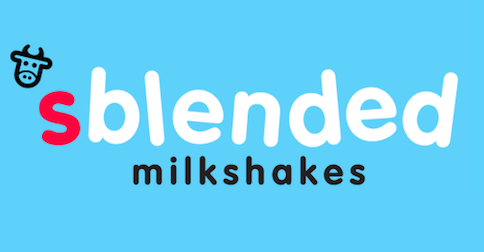 The name of Sblended, a British chain of milkshake bars, is a very nice pun. On the one hand, it’s short for ‘it’s blended’. It’s can be shortened to ts or just s, as in the title of the famous Gershwin song ’S Wonderful (the song begins one minute into the clip).
The name of Sblended, a British chain of milkshake bars, is a very nice pun. On the one hand, it’s short for ‘it’s blended’. It’s can be shortened to ts or just s, as in the title of the famous Gershwin song ’S Wonderful (the song begins one minute into the clip).
On the other hand, the name sounds just like the adjective splendid. If you remove the s from a recording of the word splendid, the remainder sounds like blended – beginning with a b, and not with a p as in plenty. Here are recordings of blended and splendid, some of which have been made by removing s from splendid or by adding s to blended:
This is not just a fact about the words blended and splendid. It applies to all syllables which begin with s followed by a ‘plosive’ consonant, ie one written with p, t, or k/c.
So speech sounds like s + beach, not like s + peach; stuck sounds like s + duck, not like s + tuck; and Scott sounds like s + got, not like s + cot.
Words like peach, tuck and cot begin with aspirated consonants. (I explain aspiration here.) Many non-native speakers of English correctly use aspirated consonants in such words, but unfortunately use the same aspirated p, t, k in s-words like speech, stuck, Scott (and splendid). This is wrong. Here I am saying Scott correctly, and repeated with a gap after the s to show that the remainder sounds like got:
And here I am saying Scott incorrectly, with aspirated k as in cot:
I explore the topic in more technical detail in my Speech Talk blog.
Da Force Awakens
 Each January, Europe’s highest town, Davos, becomes a hive of activity as it hosts the World Economic Forum.
Each January, Europe’s highest town, Davos, becomes a hive of activity as it hosts the World Economic Forum.
In America, Davos is pronounced with the PALM and GOAT vowels, as in bravo and Shakespeare’s Iago:
In England, on the other hand, Davos is pronounced with the TRAP and LOT vowels, as in tampon and Randolph:
(The last speaker there is Prime Minister David Cameron.)
Differences like this sometimes provoke debate about which of the pronunciations is ‘right’. In this case they’re both wide of the mark. In German, Davos is stressed on the second syllable, not the first, and this contains the long German vowel oː. Forvo currently has this clip contributed by a German speaker.
As I explained in this article, German oː resembles the BrE THOUGHT/NORTH vowel. German v may be pronounced f, so English people would actually get a little closer to a German version of Davos if they pronounced it more like da Force.
Further notes
A paper I published over 25 years ago explores the different treatment of loan words by AmE and BrE.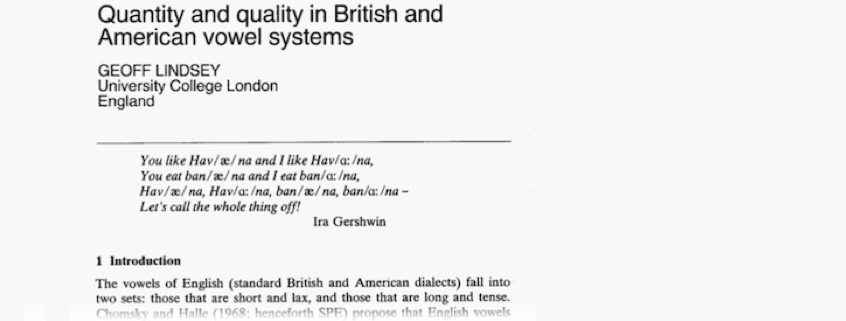 AmE has developed a tendency to pronounce written a, e, i, o, u with the vowels of PALM, FACE, FLEECE, GOAT, GOOSE in the stressed syllables of loans. BrE is rather less consistent, eg Davos with TRAP and Java with PALM.
AmE has developed a tendency to pronounce written a, e, i, o, u with the vowels of PALM, FACE, FLEECE, GOAT, GOOSE in the stressed syllables of loans. BrE is rather less consistent, eg Davos with TRAP and Java with PALM.
A 2009 article about Davos from the BBC’s Pronunciation Unit contains this rather misleading passage:
is it DAV-oss (o as in top) or dav-OHSS (oh as in no)? In fact, both pronunciations are in use: the latter is the local German pronunciation
It’s not strictly correct to claim that the words of one language contain the phonemes of another. And German Davos does not contain the əʊ or əw diphthong of BrE no. The oː of BrE north, while not a German vowel, is more similar.
CUBE: north
No Description
Bowie
 The death of David Bowie has highlighted more than ever the range of his achievements and the variety of his styles and personas. This included his performing accents, which varied from his native London (eg I’m a/the laughing gnome and you can’t catch me):
The death of David Bowie has highlighted more than ever the range of his achievements and the variety of his styles and personas. This included his performing accents, which varied from his native London (eg I’m a/the laughing gnome and you can’t catch me):
to the American-based pop-rock accent which I discussed in my article ‘Two Directions’ (eg but I can’t trace time):
Bowie’s variability even extends to the pronunciation of his name. (His adopted name, that is; Jones was his real name.) For most of my life I, like many people, pronounced the ow of Bowie with the MOUTH vowel, as in now, how and wow:
It was only relatively recently that I checked and found that the ‘right’ pronunciation has the GOAT vowel, as in low, know and show:
The BBC’s Pronunciation Unit marked Bowie’s 60th birthday in 2007 with a short piece which tells us:
Although his name is often pronounced as BOW-ee (-ow as in now) the pronunciation that he uses and we recommend is BOH-ee (-oh as in no).
There’s also at least one YouTube montage of clips in which Bowie is heard saying his name with GOAT vowel:
Despite this, the Daily Telegraph claimed this week that Bowie himself wasn’t sure how to pronounce the name. The evidence is an interview in 2000 with the BBC’s Jeremy Paxman in which Bowie says ‘I don’t even know how to pronounce it any more.’
Even David Bowie wasn’t sure how to pronounce his own surname
Among the many pub discussions prompted by David Bowie’s death on Monday (what was his best song? What was his best persona?) one conundrum was being discussed up and down the land: what exactly is the correct pronunciation of his surname? Does the “ow” in Bowie rhyme with cow, or is it bow like no?
But I think Bowie says this as a tactful way to avoid accepting the interviewer’s pronunciation, which has the MOUTH vowel. Had Paxman used the GOAT vowel, I doubt that the star would have referred to it at all.
Further notes
BOW-ee and BOH-ee are examples of the BBC’s re-spelling system. This is used because the BBC’s staff, like most people, are generally unfamiliar with special phonetic symbols. Note that the quote from the Pronunciation Unit gives example words as well, which are needed especially because the re-spelling of the MOUTH vowel as OW is ambiguous until explained. You can compare BBC-type re-spellings with phonetic symbols in the CUBE dictionary which I co-edit.)
Bowie claims in the Paxman interview that the Scots say the name not with GOAT but with GOOSE, ie as a rhyme with Louie, Hughie and Chewie. This pronunciation does exist, and not just in Scotland, eg as one pronunciation of bowie knife:
But I wonder if David Bowie in fact heard Scottish speakers saying his name with their GOAT vowel, and mistakenly interpreted this as GOOSE. Scottish MOUTH and GOAT
can sound rather like Southern England’s GOAT and GOOSE respectively:
Paves the way
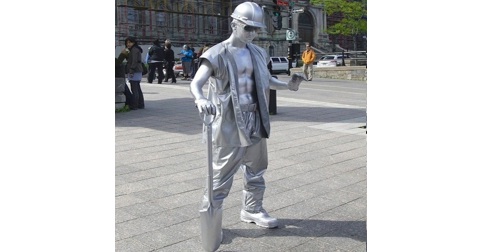 A native speaker recently asked me how to spell pays; at least that’s the word I perceived him as saying. “P.A.Y.S.,” I replied. He frowned: “No, pays as in pays the way for something – makes something possible.” “Ah,” I said, “paves the way – that’s P.A.V.E.S.” His frown deepened. “Isn’t it T.H.?” he asked, “P.A.T.H.E.S.?” “No,” I replied, “there’s no such word as pathes.”
A native speaker recently asked me how to spell pays; at least that’s the word I perceived him as saying. “P.A.Y.S.,” I replied. He frowned: “No, pays as in pays the way for something – makes something possible.” “Ah,” I said, “paves the way – that’s P.A.V.E.S.” His frown deepened. “Isn’t it T.H.?” he asked, “P.A.T.H.E.S.?” “No,” I replied, “there’s no such word as pathes.”
He still wasn’t satisfied. “There’s bath and bathe,” he said; “why isn’t it path and pathe?”
This was ingenious but off the mark. The word path is Germanic, while pave is from Old French: as far as I’m aware, the words are unrelated. Either way, there’s no verb to pathe.
Non-natives who want to sound more native can learn from this conversation. The consonants /v/ as in pave and /ð/ as in bathe are both weak, especially /ð/, and they sound quite similar. They’re both weaker than /s/ or /z/. Notably, the ending -s is more strongly pronounced than a preceding /v/ or /ð/. Non-natives often under-pronounce final consonants: the later in a word a sound appears, the more weakly they tend to pronounce it. But the ending -s is important in English and should never be skimped. Even if the next word is the, as it so often is, -s remains stronger than the consonants around it.
So in running speech paves the way can easily sound rather like pays the way. Likewise, bathes the child can sound like bays the child. And, if the word pathes existed, it could sound rather like paves. Here is paves the way, first hyper-articulated and then said more rapidly:
And, similarly, bathes the child:
Further notes
The auditory-acoustic similarity of /v/ and /ð/ underlies the increasing tendency of British speakers to replace /ð/ with /v/ non-initially, so that other rhymes with cover and breathe rhymes with leave. I show video examples of BBC presenters doing this in my blog post here.
My interlocutor is certainly not the first person to posit a verb pathe. Mitko Sabev has kindly forwarded an entry for it from the Oxford English Dictionary, which contains this:
Etymology: Apparently a variant or alteration of another lexical item. Etymons: PAVE v.
Apparently a variant of PAVE v., probably by association with PATH n. Compare PAITHMENT n., PATH v., PATHING n. Examples from before the 20th cent. not having the -ed or -ing form are rare, so that the spelling and pronunciation of the base form are unclear; but compare PAITHMENT n., with Middle English long ā and its later reflexes. In recent use the base form (with and without the 3rd singular present ending -s) has been spelt pathe, implying the pronunciation /peɪð/.
Now colloq. (nonstandard).
Google currently finds about eight and a half million results for “pave the way”, about 3,750 for “pathe the way”.


